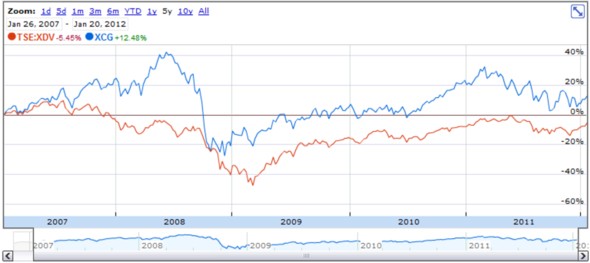Dividends: Not as tax-friendly as you may think
If your investments include RRSPs, TFSAs and taxable accounts, asset location is an important consideration. The returns of various asset classes—such as bonds, Canadian stocks, and foreign stocks—are treated differently under tax law. So by selecting the most tax-advantaged assets for your non-registered accounts, you should be able to keep more of the returns for [...]
 As you can see from the above chart, the iShares Dow Jones Canada Select Growth Index Fund (XCG) has seen much greater price appreciation than the than the iShares Dow Jones Canada Select Dividend Index Fund (XDV). However, because growth stocks, by definition, don’t pay generous dividends, the yield on XCG is only about 0.7%. Meanwhile, XDV pays about 3.8% in dividends annually.
As it turns out, over the last five years, the two ETFs delivered virtually identical total returns: 1.85% versus 1.87% annualized. However, investors in a high tax bracket would have kept more of XCG’s returns for themselves. Because capital gains are only taxable in the year they are realized (that is, when you sell at a profit), an investor who held XCG in for the whole five years would have only paid tax on that very small dividend.
The information in this post should in no way be considered tax advice for individuals. Always consult an accountant or qualified advisor before making any investment that has tax consequences.
As you can see from the above chart, the iShares Dow Jones Canada Select Growth Index Fund (XCG) has seen much greater price appreciation than the than the iShares Dow Jones Canada Select Dividend Index Fund (XDV). However, because growth stocks, by definition, don’t pay generous dividends, the yield on XCG is only about 0.7%. Meanwhile, XDV pays about 3.8% in dividends annually.
As it turns out, over the last five years, the two ETFs delivered virtually identical total returns: 1.85% versus 1.87% annualized. However, investors in a high tax bracket would have kept more of XCG’s returns for themselves. Because capital gains are only taxable in the year they are realized (that is, when you sell at a profit), an investor who held XCG in for the whole five years would have only paid tax on that very small dividend.
The information in this post should in no way be considered tax advice for individuals. Always consult an accountant or qualified advisor before making any investment that has tax consequences.










Great article, thanks!
Thanks for this!
For Canadians in the highest tax bracket, does it make sense to have non or low dividend paying companies in their taxable account vs higher dividend paying companies? Other articles I have read suggest the advantages of the Dividend tax credit outweighing the capital gain structured portfolio. Your thoughts are greatly appreciated. fyi i am living in ontario.
Cheers!
Due to the large volume of comments we receive, we regret that we are unable to respond directly to each one. We invite you to email your question to [email protected], where it will be considered for a future response by one of our expert columnists. For personal advice, we suggest consulting with a qualified advisor.